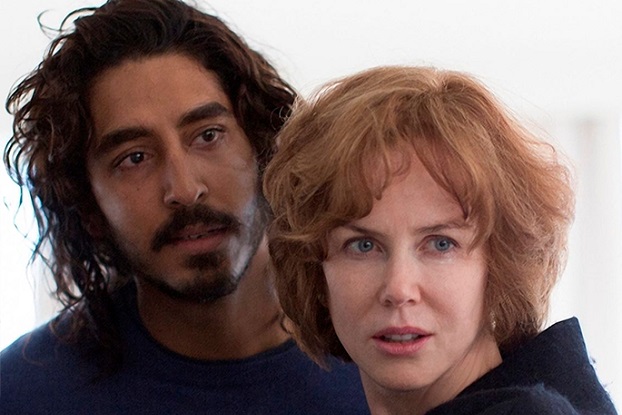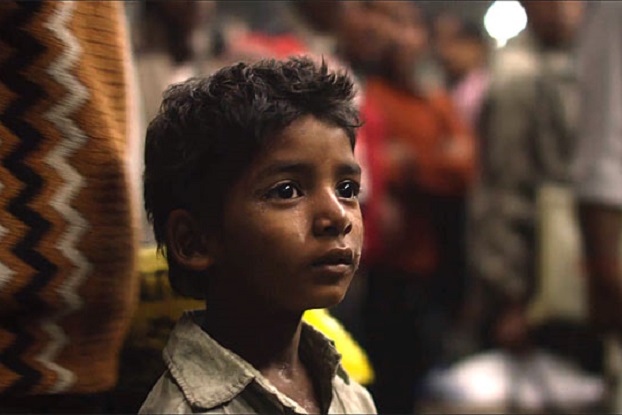
In recent years, more nuanced depictions of transnational adoptions have made their way into our news, literature, and films. From the tragic story of Adam Crapser, to poignant essays by writers like Nicole Chung, they provide nuanced perspectives exploring the impact of transnational adoptions on adoptees and adoptive parents. Lion, based on the true story of Saroo Brierley, and his journey from Australia to India to find his birth mother and family, joins the realm of these stories, which illustrate that a child’s adoption may be the end of one leg of their journey, but also perhaps, the beginning of another.
The film, directed by Garth Davis and starring Dev Patel, Nicole Kidman, and Rooney Mara, opens on five-year-old Saroo who accompanies his beloved older brother Guddu as he does whatever odd jobs he can to earn money for their family, which includes their mother, a laborer, and little sister. Saroo, who wants to be just like his big brother, helps him pilfer coal from a coal train, narrowly escaping the clutches of a security guard. When they go to resell the coal, Saroo’s eyes rest longingly on the luxurious, deliciousness of jalebis, frying on a close by pan. He and Guddu joke in Hindi that one day, they will not just have tens of jalebis, they will have an entire jalebi shop.
Not long afterwards Saroo convinces Guddu to let him accompany him as he scavenges from overnight trains. However, Saroo falls asleep on the station platform, and when he wakes, Guddu is nowhere to be found. He climbs onto a decommissioned train, and travels for what seems like days, and when he disembarks, he is surrounded by strangers, speaking in a foreign tongue — Bengali. Saroo endures great hardship and sinister cruelty as a child of the streets, but even as he lives by his wits, he plots to find his way back home to his family. Through twists of fate that would stretch the bounds of a novel, Saroo finds an advocate, who in turn finds him an adoptive family, half a world away, in Tasmania.
Wide-eyed Saroo arrives into the loving arms of John and Sue Brierley, an Australian couple who have eagerly awaited his arrival to start their family. Until recently, most movies about transnational adoption would end here, at what has traditionally been perceived as a happy ending: young boy from developing world, narrowly escapes poverty and exploitation, miraculously gets adopted by white family in developed world, receives boundless love and material comfort.
However, just as Lion depicts Saroo’s fraught path to being adopted across the world, it depicts his difficult quest to find his birth family, guided by a strange combination of his own hazy memories and mapping technology. Rather than unfolding in a continuous and linear fashion, Lion is told in episodic scenes, that flash back and forward.
“Saroo’s first wave of memories comes as he picks up a jalebi at a university party”
This form of cinematic storytelling is effective since adult Saroo begins to remember pieces of his past, and moments from his childhood begin to visit him. Sometimes the movie is sappy and heavy-handed in using this treatment. Saroo’s first wave of memories comes as he picks up a jalebi at a university party and suddenly, the jalebi is not the only thing drenched in syrupy sweetness.
Soon however, the memories turn to shards, invading his present life, becoming Saroo’s singular and solitary obsession. Saroo grows increasingly desperate as he tries to make meaning out of these incomplete shards of memories, and distraught as he thinks about the mother, brother, and sister who he’s sure have been searching and waiting for him these past 25 years.

Lion has received several award nominations including Screen Actors Guild and Golden Globe nominations for Best Actor and Best Actress for Dev Patel and Nicole Kidman. Kidman gives a tempered yet heart wrenching performance as Saroo’s adoptive mother, and Patel eschews the over-earnestness seen in some of his previous roles to give his most nuanced performance to date. But the most powerful performance in the movie comes from Sunny Pawar, the eight-year-old Indian child actor who plays young Saroo, navigating his way through a harrowing journey that takes him halfway around the globe.
“Lion doesn’t shy away from some of the darkest aspects of transnational adoption”
While Lion is a strong film, it’s not perfect — it never makes clear if Saroo has been visited by memories of his family throughout his time in Tasmania, or if they were truly first triggered by his bite into a jalebi. One of the risks of telling such a complex story episodically is that some of the nuance gets lost.
However, I admire that Lion doesn’t shy away from some of the darkest aspects of transnational adoption — the risk of child trafficking, post-adoption adjustment, the void of identity and origin experienced by some adoptees. Ultimately, Lion provides a compelling and more complete portrayal of one transnational adoptee’s journey, — a journey to two mothers on different continents.
https://youtu.be/ziOLGzKq6oo
* * *
Kavita Das writes about culture, race, social change, feminism, and their intersections. She’s been nominated for a Pushcart Prize and published in The Los Angeles Review of Books, The Atlantic, Guernica, VIDA, Apogee Journal, and elsewhere, and is currently working on a biography about Grammy-nominated Hindustani singer, Lakshmi Shankar to be published by Harper Collins India.












